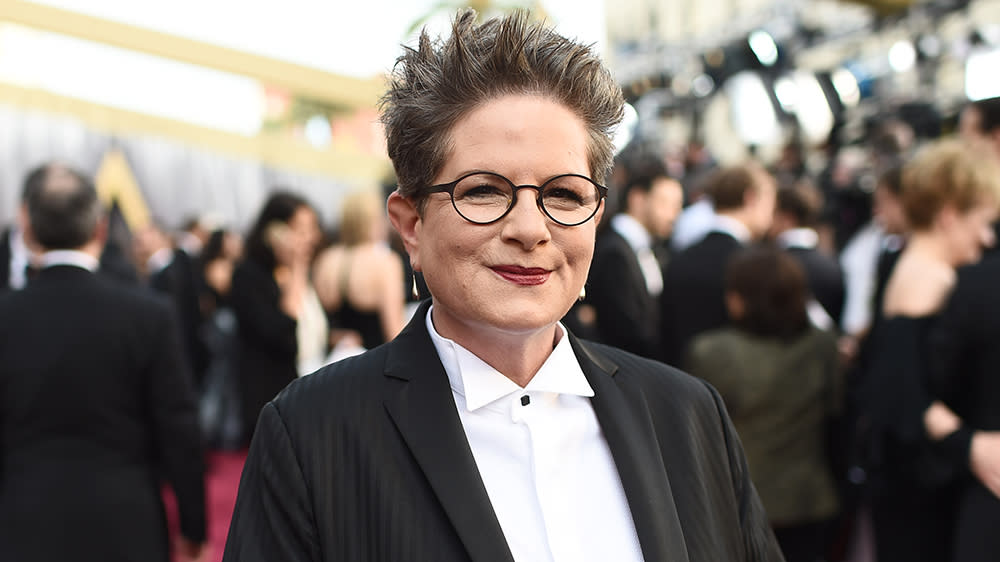Writers Guild Presidential Candidate Phyllis Nagy Blasts Strategy on Agencies

Click here to read the full article.
Phyllis Nagy, who is challenging Writers Guild of America West’s president David Goodman, has warned of dire consequences from the current stalemate between the WGA and Hollywood agents.
Nagy, who announced her candidacy on July 22 as the head of Writers for Negotiation, is running on a platform that the WGA needs to get back to the bargaining table after two months of staying away. The contest, which includes races for secretary-treasurer and eight board seats, is viewed as a referendum on the WGA’s hard-nosed approach versus more accommodating tactics. Election results will be announced on Sept. 16.
More from Variety
Writers Guild Withdraws State Suit Against Agencies, Refiles in Federal Court
Writers Guild Leaders Accused of 'Vitriol': 'The Guild Is in Crisis'
Goodman announced on June 20 that the guild had called off negotiations with the Association of Talent Agents in favor of pursuing individual talks with nine top agencies as it enforces a total ban on packaging fees and affiliated production for agents representing guild members. A trio of mid-size agencies — Verve, Buchwald and Kaplan Stahler — have signed agreements in recent months.
The issue of packaging fees, under which agents are paid fees by the studio instead of commissioning their clients, is a critical part of the stalemate between the WGA and the agencies. The guild is claiming that such fees are illegal and has sued CAA, WME, UTA and ICM Partners. That’s resulted in countersuits by CAA, WME and UTA, alleging that the guild is violating antitrust laws.
Nagy claimed on Monday that — as of May 1, 2020 — about 75% of WGA members will have been without agents for well over one year, and with no agreement in place for a successor deal on the current master contract, members will also be on strike. She asserted that WGA West executive director David Young is an advocate of going on strike. The current master contract with the Alliance of Motion Picture and Television Producers expires May 1 and no talks have been set.
“Our Executive Director has made it clear that as a Guild, we don’t make the best deals because we don’t stay out long enough,” she said. “How long is enough? A year. Maybe more. Are we prepared to wake up on May 1, 2021, without reps and without work? Do you think this scenario is unreasonable? Do you think we can’t find ourselves there?”
“If you think it unreasonable, ask yourself this question: Did you ever imagine our Guild would take action against our chosen representatives in the manner that we have and with leadership admitting, four months in, that they didn’t expect an action of this length? Because that’s exactly where we are.”
Nagy asserted that the idea of negotiating with the individual smaller agencies won’t work in the long run.
“For over four months, we’ve been engaged in a divide and conquer strategy, actually negotiating with agencies who do not, by and large, engage in packaging, benefit from it, or have ownership stakes in affiliate production companies. In other words: we are successfully negotiating with people who can’t solve our problems,” she said.
“While it’s wonderful that some writers can return to work with agents, it’s unacceptable that the burden of ‘suffering’ leadership has asked of us is not borne equally — as it would be in a strike,” Nagy said. “Do the math. In the next eight months, we might expect the divide and conquer strategy to work with how many more agencies? Four? Six? Perhaps all the remaining ATA mid-level agencies will come to separate franchise agreements with the Guild.”
“While I’d be the first to congratulate and cheer on the roughly 25% of membership who would benefit from those agreements, the vast majority of us would continue to unequally bear the burden of this action,” she added. “As long as we refuse to counter the formal offer presented by the ATA in June, we will not begin to resolve the very practices leadership has given us for the basis of the current action— abuses of packaging, packaging fees and affiliate production companies.”
Nagy said that keeping current leadership in power will result is lawsuits whose eventual costs can’t be calculated or covered by the Guild’s surplus. She said that her slate, if elected, will counter aggressively to the ATA’s last offer and fight to ensure that any gain from revenue sharing finds its way into the pockets of low and mid-level writers.
Negotiating committee member John August issued a defense two weeks ago of the WGA’s strategy of negotiating with individual agencies, noting that it led to the Verve, Buchwald and Kaplan Stahler deals.
Veteran writer-showrunner William Schmidt is also running on against Goodman on a platform similar to Nagy’s.
Sign up for Variety’s Newsletter. For the latest news, follow us on Facebook, Twitter, and Instagram.

